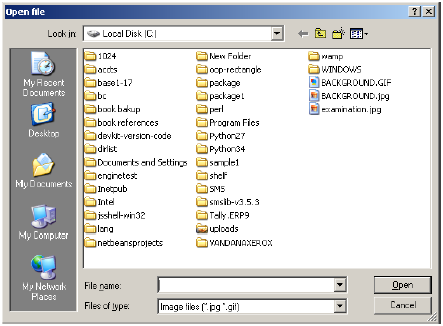Getopenfilename Default File Pathway

The buffer must be large enough to store the path and file name string or strings, including the terminating null character. GetOpenFileName and GetSaveFileName return False if the buffer is too small to contain the file selected information. The buffer should be at least 260 characters long.
Specifies the file filters or translators available to the application. The filter string consists of pairs of file filter strings followed by the MS-DOS wildcard file filter specification, with each part and each pair separated by commas. For example, the following string specifies a text file filter: 'Text Files (*.txt),*.txt'. To use multiple MS-DOS wildcard expressions for a single file filter type, separate the wildcard expressions with semicolons.
For example: 'Solid Edge Files (*.asm; *.prt),*.asm;*.prt'. If omitted, this argument defaults to 'All Files (*.*),*.*'. LinksUpdate Value Description igLinksUpdateWithAltPath Update links with alternate path igLinksUpdateWithDefpath Update links with default path igNoLinksUpdate Do not update links This option is not supported in this release. AltLinkPath This option is not supported in this release. DocAccess Value Description igReadExclusive Document has exclusive read access igReadOnly Document has read-only access igReadWrite Document has read-write access Member of the DocumentAccess constant set that specifies the read-write access by which the specified document should be opened. OptNotify Value Description igNoNotify Do not notify igNotifyWhenAvailable Notify when the document is available igNotifyWhenExclusive Notify when the document is exclusive igNotifyWhenReadable Notify when the document can be read igNotifyWhenWriteable Notify when the document can be written Member of the NotifyOption constant set that specifies the notification requested by the user on the selected document. DocRelationAutoServer Specifies a variable to receive the document relations automation object, which can be used to enumerate specified linked documents.
FileFilter Specifies the file filters or translators available to the application. The filter string consists of pairs of file filter strings followed by the MS-DOS wildcard file filter specification, with each part and each pair separated by commas. For example, the following string specifies a text file filter: 'Text Files (*.txt),*.txt'. To use multiple MS-DOS wildcard expressions for a single file filter type, separate the wildcard expressions with semicolons. For example: 'Solid Edge Files (*.asm; *.prt),*.asm;*.prt'.
It turned out to be a very complicated deal and I have to say I was staggered by the commitment and effort that was required from us all. I would like to thank you and the team for the major contribution you made in the sale of Cromptons Healthcare. .jpg) I was impressed by both the professionalism and the support that Rockworth provided, which proved to be absolutely essential to me.
I was impressed by both the professionalism and the support that Rockworth provided, which proved to be absolutely essential to me.
If omitted, this argument defaults to 'All Files (*.*),*.*'. FilterIndex Specifies the index number in the FileFilter array indicating the default filter to be used. If this argument is omitted or negative or greater than the number of filters present, the first file filter is used. Title Specifies the dialog title. If this argument is omitted, the dialog title is 'Open'.
IgnoreWarnings If the argument is True, the user is not prompted with warning dialog boxes regarding the file availability, and default action is taken. If the argument is False, the warning dialogs are presented to the user. If the argument is omitted, the warning dialogs are presented to the user. This method displays the File Open dialog box.
This is the same dialog box that is displayed when the user selects Open from the File menu. This dialog box allows a user to browse files in the file system and to select a file to open. This method returns the file name without actually opening it. The selected filter is not returned, but it can be determined from the file type of the returned file. Displays a preview of a selected document and its state. When available, a thumbnail preview of the currently selected document is provided. An icon that describes the state of the document is also displayed.
Provides a way to specify a directory path to override the location of document links. Provides access to the Compound page in which the user can select which linked documents should be activated.
Code: Sub TestIt() NewFN = Application.GetOpenFilename(FileFilter:='Excel Files (*.xls), *.xls', Title:='Please select a file') If NewFN = False Then ' They pressed Cancel MsgBox 'Stopping because you did not select a file' Exit Sub Else Workbooks.Open Filename:=NewFN End If End Subwhat I can't quite figue out is how to specify the path in which the Application.GetOpenFilename statement should look. To direct it to the folder from which I want it to list the files. (I think this may need to be set in a seperate line of code?) Thanks for any help. Code: ' Change to G: drive and show filtered file list for selection ChDrive 'G' ChDir 'G: Systems Services peakdata' newfn = Application.GetOpenFilename(filefilter:='Text Files (*.csv),*.csv') If newfn = False Then ' Cancel was pressed MsgBox 'Cancel - Program Will HALT' End Else Workbooks.Open Filename:=newfn ipname = ActiveSheet.Name & '.csv' End IfI have been trying to achieve it through use of parameters on the Application.GetOpenFilename statement but it doesn't appear to cater for this.